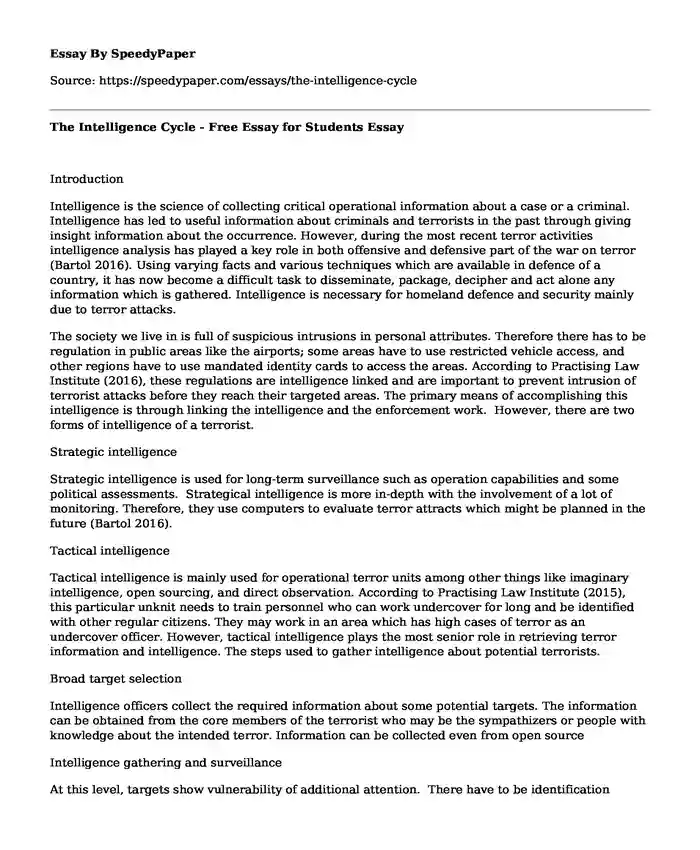
| Type of paper: | Essay |
| Categories: | Psychology Criminal law |
| Pages: | 3 |
| Wordcount: | 617 words |
Introduction
Intelligence is the science of collecting critical operational information about a case or a criminal. Intelligence has led to useful information about criminals and terrorists in the past through giving insight information about the occurrence. However, during the most recent terror activities intelligence analysis has played a key role in both offensive and defensive part of the war on terror (Bartol 2016). Using varying facts and various techniques which are available in defence of a country, it has now become a difficult task to disseminate, package, decipher and act alone any information which is gathered. Intelligence is necessary for homeland defence and security mainly due to terror attacks.
The society we live in is full of suspicious intrusions in personal attributes. Therefore there has to be regulation in public areas like the airports; some areas have to use restricted vehicle access, and other regions have to use mandated identity cards to access the areas. According to Practising Law Institute (2016), these regulations are intelligence linked and are important to prevent intrusion of terrorist attacks before they reach their targeted areas. The primary means of accomplishing this intelligence is through linking the intelligence and the enforcement work. However, there are two forms of intelligence of a terrorist.
Strategic intelligence
Strategic intelligence is used for long-term surveillance such as operation capabilities and some political assessments. Strategical intelligence is more in-depth with the involvement of a lot of monitoring. Therefore, they use computers to evaluate terror attracts which might be planned in the future (Bartol 2016).
Tactical intelligence
Tactical intelligence is mainly used for operational terror units among other things like imaginary intelligence, open sourcing, and direct observation. According to Practising Law Institute (2015), this particular unknit needs to train personnel who can work undercover for long and be identified with other regular citizens. They may work in an area which has high cases of terror as an undercover officer. However, tactical intelligence plays the most senior role in retrieving terror information and intelligence. The steps used to gather intelligence about potential terrorists.
Broad target selection
Intelligence officers collect the required information about some potential targets. The information can be obtained from the core members of the terrorist who may be the sympathizers or people with knowledge about the intended terror. Information can be collected even from open source
Intelligence gathering and surveillance
At this level, targets show vulnerability of additional attention. There have to be identification procedures with observable routines, information on residence of the terrorist and planning of immediate securities measures which can be taken (Bartol 2016).
Particular target selection
Some major things to consider is if the terror will affect a large number of people, will it attract the media’s attention and if there are cost benefits to the terrorist. It also shows the main reason for the attack.
Pre-attack surveillance patterns
According to Practising Law Institute (2015), this phase gathers routine and current patterns of the terrorist. This stage is carried out by well-trained agents though it might take long to pick the precise movement of the terrorist.
Action of the objective
At this level, the operations are to pin down the suspect. However, the targets of the attack possess the significant tactical advantages. Therefore, it is important to neutralize the targets advantage which can either be through arrest or assassination of the targets before they accomplish their mission. Exploration is the primary objective of the operation. Therefore, it should only affect the suspects alone (Bartol 2016).
References
Bartol, M. (2016). Current perspectives in forensic psychology and criminal behaviour. Los Angeles: SAGE.
Practising Law Institute, (2015). Electronic information in criminal investigations & prosecutions. New York, New York: Practising Law Institute.
Cite this page
The Intelligence Cycle - Free Essay for Students. (2018, Jan 24). Retrieved from https://speedypaper.com/essays/the-intelligence-cycle
Request Removal
If you are the original author of this essay and no longer wish to have it published on the SpeedyPaper website, please click below to request its removal:
- Law Essay Sample: History of Punishment
- Free Essay on Equity Employment Program
- Political Transformation Essay Example for Your Inspiration
- Free Paper Sample Dedicated to Adolescence and Parenthood
- Essay Example. Women and Gender Studies
- Healthcare Management Intermountain Healthcare (IHC). Paper Example
- Paper Example. The Three Escape Mechanisms
Popular categories




